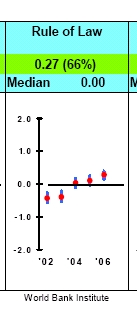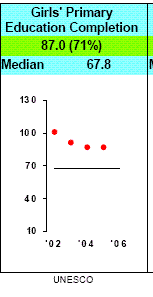Generally, Georgia has been doing well. Most trends are going up, in particular in the Ruling Justly category. Control of corruption is increasing, the government is becoming more effective, and Freedom House suggests that political rights and civil liberties have been expanding (it will be interesting to see how they assess 2007: is that becoming darker, or indeed just flickering?). The World Bank Institute also suggests that the rule of law is improving — maybe not something that everybody would agree with, but the chart concedes a margin of error that just about allows alternative interpretation.
There is a small dip in Voice and Accountability, where Georgia is above the median, but (according to data from the World Bank Institute) moving downward again in 2006.
Georgia does extremely well for land rights and access, being top of all the scored countries (IFC data). The same is true for business start up (IFC). Fiscal policy and inflation, however, have a downward trend, so Georgia is not scoring too well here.
In setting basic conditions for development, Georgia is and remains a success story. Obviously, the successes can be put at risk, since some of the achievements remain fragile. If we take the liberty to speculate, there are practical implications for current events. Politically, the opposition probably would be better served to move away from their hyperbole, and to concentrate on the problematic indicators (inflation, fiscal policy, voice and accountability), as well at the significant risks that the government is running, which may imperil all the other achievements so far. This would put them in line with the data on the ground.
One small puzzle is that supposedly girls’ primary education completion is falling. Any idea why that may be the case? Is it just better data? Or migration?
The scorecards in general are exemplary in their presentation, with detailed datanotes, and a downloadable Excel overview (which reminds you that Georgia is a Lower Income Country, whereas Armenia and Azerbaijan are listed as Lower Middle Income Countries). Altogether an excellent shorthand introduction to governance in the respective countries.










